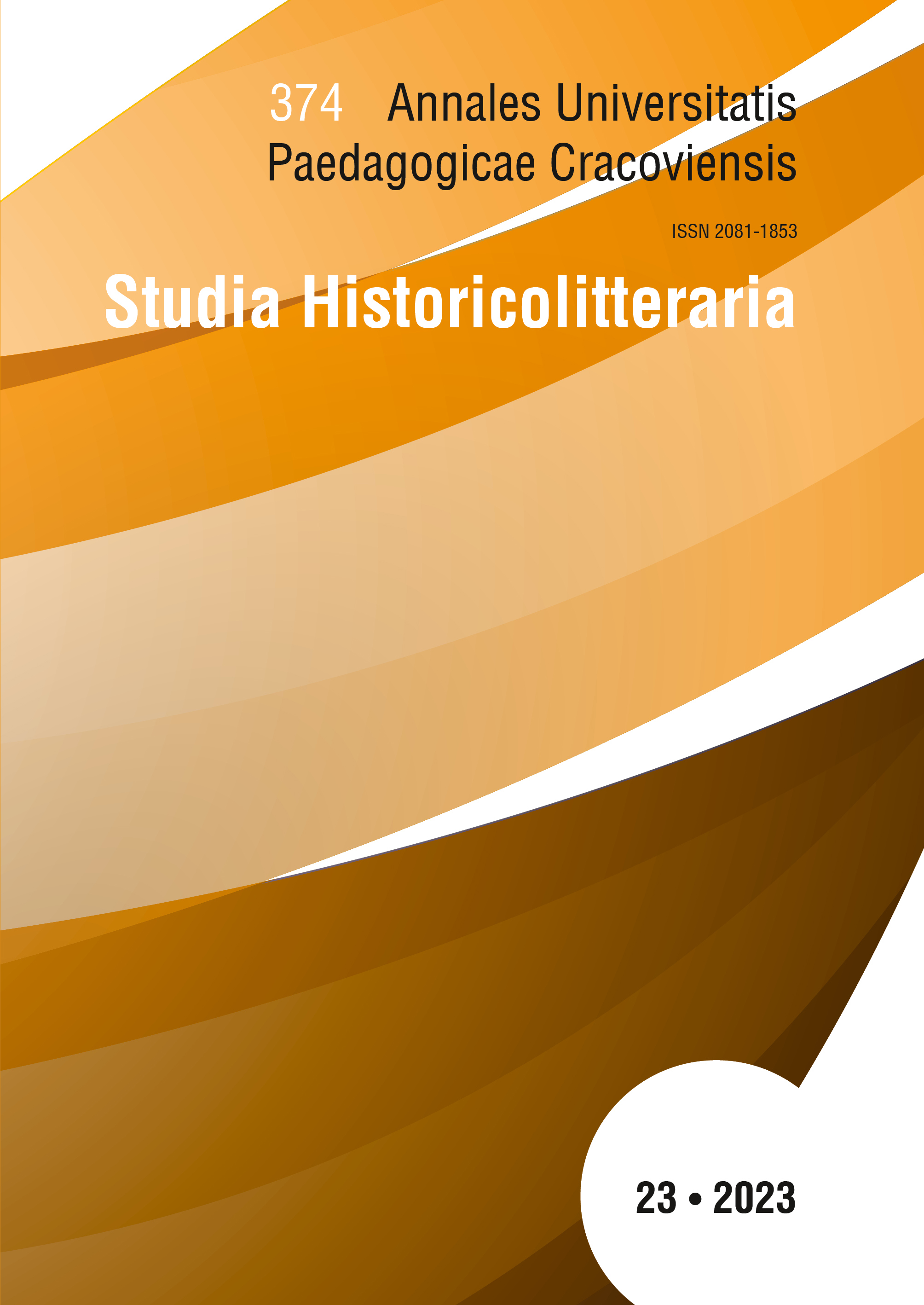Konstruowanie siebie w opowieści – o historii i tożsamości w "Domu kata" Andrei Tompy
Main Article Content
Abstrakt
The main purpose of the article is to present the literary output of Andrea Tompa, using her debut collection entitled Dom kata as an example. In her work, the Hungarian writer uses her creative potential connected with the experiences of growing up in a discriminated national minority in Romania in the 1980s. In the paper, I demonstrate how the history of the area and biography intertwine in the literary transformation of experience in a quasi‑autobiographical story about entering adulthood. In Andrea Tompa’s work, one can see how the geo‑cultural experience has an impact on both the way the story is constructed and the narrative strategies applied, as well as its influence on the reception of the work among readers. The trauma of the regime and exclusion associated with Romania in the second half of the 20th century is conveyed by means of a hybrid form and fragmented narratives. This unique combination that makes up the book of the Hungarian writer provides an inspiring material for literary research, both from the perspective of memory studies and the poetics of experience. As for the way of constructing the story, which is hard to categorize according to strict genre classifications, it only enlivens the reception.
Downloads
Article Details

Utwór dostępny jest na licencji Creative Commons Uznanie autorstwa – Użycie niekomercyjne – Bez utworów zależnych 4.0 Międzynarodowe.
POLITYKA PRAW AUTORSKICH
Wydawca „Annales Universitatis Paedagogicae Cracoviensis. Studia Historicolitteraria” jest upoważniony do korzystania oraz do rozpowszechniana wszystkich opublikowanych w czasopiśmie materiałów na podstawie umowy licencji niewyłącznej, zawartej uprzednio na czas nieoznaczony każdorazowo z autorem/ką konkretnego utworu na określonych w tamtejszej umowie polach eksploatacji.
POLITYKA OTWARTEGO DOSTĘPU
„Annales Universitatis Paedagogicae Cracoviensis. Studia Historicolitteraria” to czasopismo o otwartym dostępie, a cała jego zawartość jest dostępna bezpłatnie dla użytkowników i instytucji na zasadach licencji niewyłącznej CreativeCommons (CC BY-NC-ND 4.0). Użytkownicy/ki mogą czytać, pobierać, wykonywać kopie, rozpowszechniać, drukować, wyszukiwać lub linkować do pełnych tekstów artykułów w tym czasopiśmie bez uprzedniej zgody wydawcy lub autora/ki pod warunkiem podania źródła dostępu i autorstwa danej publikacji. Jest to zgodne z definicją otwartego dostępu BOAI (http://www.soros.org/openaccess).
Bibliografia
Assmann A., Cztery formy pamięci, przeł. K. Sidowska, [w:] tejże, Między historią a pamięcią. Antologia, red. M. Saryusz‑Wolska, Warszawa 2013, s. 39–57.
Assmann A., Przestrzenie pamięci. Formy i przemiany pamięci kulturowej, przeł. P. Przybyła, [w:] Pamięć zbiorowa i kulturowa. Współczesna perspektywa niemiecka, red. M. Saryusz‑Wolska, Kraków 2009, s. 101–142.
Assmann J., Pamięć zbiorowa i tożsamość kulturowa, przeł. S. Dyroff, R. Żytyniec, „Borussia” 2003, nr 29, s. 16.
Czermińska M., Trójkąt autobiograficzny. Świadectwo, wyznanie i wyzwanie, Kraków 2000.
Faragó K., A viszonosság alakzatai, Újvidék, 2009.
Hejmej A., Komparatystyka. Studia literackie – studia kulturowe, Kraków 2013.
Kulturowa teoria literatury. Główne pojęcia i problemy, red. M.P. Markowski, R. Nycz, Kraków 2006.
Kunz T., Więcej niż słowa. Literatura jako forma istnienia, Kraków 2019.
Łebkowska A, Empatia. O literackich narracjach przełomu XX i XXI wieku, Kraków 2008.
Łebkowska A., Fikcja jako możliwość. Z przemian prozy XX wieku, Kraków 1998.
Nęcka A., Emigracje intymne: o współczesnych polskich narracjach autobiograficznych, Katowice 2013.
Nieszczerzewska M., Narracje miejskiej wyobraźni, Poznań 2009.
Nycz R., Poetyka doświadczenia. Teoria – nowoczesność – literatura, Warszawa 2012.
Pekaniec A., Dlaczego (auto)biografie? Literatura dokumentu osobistego kiedyś i dziś, „Autobiografia. Literatura. Kultura. Media” 2022, nr 1, s. 125–144.
Rybicka E., Geopoetyka. Przestrzeń i miejsce we współczesnych teoriach i praktykach literackich, Kraków 2020.
Rybicka E., Miejsce, pamięć, literatura (w perspektywie geopoetyki), „Teksty Drugie” 2008, nr 1–2, s. 19–32.
Tabaszewska J., Od literatury jako medium pamięci do poetyki pamięci, „Pamiętnik Literacki” 2013, z. 4, s. 53–72.
Tompa A., Dom kata, przeł. A. Butrym, Wrocław 2016.
